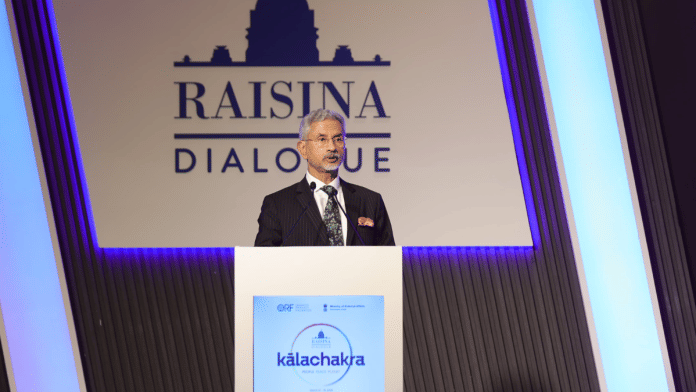New Delhi: Prime Minister Narendra Modi on Monday inaugurated the tenth edition of Raisina Dialogue, India’s premier multilateral conference on geopolitics hosted by the Observer Research Foundation (ORF) in partnership with the Ministry of External Affairs (MEA).
Modi declared the conference open with a simple namaste on stage, alongside this year’s chief guest, New Zealand Prime Minister Christopher Luxon. The vote of thanks was given by External Affairs Minister S. Jaishankar, who spoke of the timeliness of a gathering like Raisina—especially in this current geopolitical moment.
“Ladies and gentlemen, the world order is clearly undergoing a great churn,” said Jaishankar. “This requires leadership of the kind that we have in the room today. It requires new systems to think differently, not simply falling back on old assumptions to deal with new situations. And it requires honest conversations, fresh ideas, and creative solutions. The value proposition that Raisina offers in that regard is higher than ever.”
While Modi didn’t speak at the inauguration, Jaishankar gave a brief three-minute vote of thanks during which he thanked Modi’s “vision and motivation” for driving the Raisina Dialogue.
“As we begin this tenth edition, I hope that we have lived up to his expectations of India hosting a world-class gathering,” Jaishankar said, referring to Modi. He also reiterated the MEA’s support to ORF, noting that the Foundation is now being appreciated across geographies.
Luxon thanked his “good friend” Modi for generously welcoming him and his delegation to India during his 20-minute speech, during which he talked about the Indo Pacific region and India’s geostrategic heft.
“I’m a great admirer of your achievements as prime minister,” said Luxon, before listing some of India’s achievements in the past decade—India not only “weathered the COVID storm”, but also managed to expand India’s economy to lift over 250 million Indians out of poverty, and show the world India’s “technological prowess.”
Luxon situated Raisina Dialogue as “among this catalogue of achievements,” describing it as a forum for thought leaders to focus their intellectual capabilities on the Indo Pacific. While he talked of how past assumptions of previous generations’ geopolitical relations have been totally upended, US Director of National Intelligence Tulsi Gabbard was seen nodding in the audience.
“India and New Zealand are fortunate enough to live in the world’s most economically dynamic region,” Luxon said, adding that the Indo Pacific represents two-thirds of global economic growth over the next few years. “India lies at the heart of this exciting economic future.”
India’s role in Indo Pacific
Luxon, who spoke before Jaishankar acknowledged the changing world order, also spoke of the ways in which geopolitics have shifted—while also extolling the potential of the Indo Pacific region.
“The world is now shifting from unipolarity to multipolarity,” said Luxon. “From free trade to protectionism. From multilateralism to unilateralism. From globalisation to hyper nationalism. From openness to xenophobia, and from optimism to anxiety,” he said, adding that these changes are visible in the Indo Pacific, too.
He then went on to list some of the most significant geopolitical and geoeconomic shifts he’s noticed: rules giving way to power, a shift from economics to security, and a shift from economic efficiency to resilience.
The development of the region, said Luxon, therefore depends on significant partners like India.
“In an increasingly multipolar world, India’s size and geostrategic heft gives you autonomy,” he said. “At the same time, your democratic partners can be a force multiplier for our convergent interests.”
Luxon’s speech also included a roundup of India’s significant progress, but also the potential it offers in the region—cementing the global view of India as an economic and technological powerhouse. The key to unlocking the technological might that will define the world to come, Luxon said, lies in the “citizens, companies, and countries” in the Indo Pacific.
“With a country as consequential as India, we need rich political interactions, engaged militaries, strong economic architecture, and connections that support a diaspora that bridges our two great nations,” Luxon said, adding that the two heads of state have charted a roadmap for the future relationship between India and New Zealand — including the beginning of free trade agreement (FTA) talks.
The inauguration was opened by ORF president Samir Saran and chairman Sunjoy Joshi, who introduced the theme of this year’s dialogue—‘Kalachakra: People, Peace, Planet.’
“I know I speak for all of you when I say: let the dialogue begin,” Jaishankar said, closing the inauguration.
(Edited by Tony Rai)
Also Read: US concerned about ‘persecution & killing of religious minorities’ in Bangladesh, says Tulsi Gabbard






